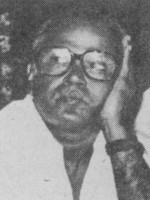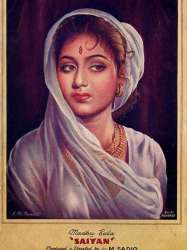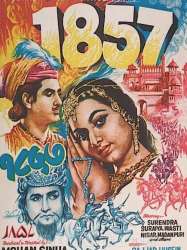Sajjad Hussain est un Son Indien né le 15 juin 1917

Sajjad Hussain (15 June 1917, Sitamau - 21 July 1995) was an Indian film score composer.
In 1937, Sajjad Hussain decided to try his luck as a film score composer, and came to Bombay with his elder brother Nissar Hussain. His first job was at Sohrab Modi's Minerva Movietone at Rs. 30 a month. He later moved to the Wadia Movietone, working at Rs. 60 a month. During the next few years, he worked as an assistant to Meer Saheb and Rafiq Gaznavi, and as a contract player for Shaukat Hussain Rizvi.
In the early 1940s, Sajjad was introduced to the composer Ali Baksh (father of the actress Meena Kumari) by a friend. Impressed with Sajjad's mandolin skills, Ali employed him as an assistant.
Sometime later, Sajjad became an assistant to the music director Hanuman Prasad. In this capacity, he composed two songs for the film Gaali (1944): Aag Lage Saavan Mein and Ab Aaja Dil Na Lage (both sung by Nirmala Devi). The songs of Dost (1944), his first film as an independent music director, were hit. These songs included three songs sung by Noor Jehan: Koi Prem Ka Deke Sandesa, Alam Par Alam Aur Sitam Par Sitam and Badnaam Mohabbat Kaun Kare.
Sajjad went on to work with many notable singers, including Suraiyya, Lata Mangeshkar and Asha Bhosle. He was regarded highly by his contemporaries, including Anil Biswas. In a 2012 interview, Lata Mangeshkar named him as her favorite composer.
Sajjad Hussain was known for his contentious personality. He often landed in controversies due to his short temper, outspokenness, moody behavior and perfectionist nature. When Shaukat Hussain Rizvi gave the credit for the musical success of Dosti (1944) to his wife and singer Noor Jehan, Sajjad vowed never to compose a song for Noor Jehan. He had conflicts with the lyricist D N Madhok during recording of Saiyyan (1951), and with the actor Dilip Kumar during the recording of Sangdil (1952). He made disapproving remarks on Lata Mangeshkar's singing, leading to differences between the two for a short period. He called Talat Mehmood as "Galat Mehmood" (Wrong Mehmood) and Kishore Kumar as "Shor Kumar" (Noisy Kumar), and also criticized Naushad's music. He rejected an offer by Shashadhar Mukherjee of Filmistan, and lost Mughal-e-Azam (1960) due to differences with K. Asif. Once, heavily impressed by Sajjad Hussain's Yeh hawa yeh raat yeh chandni (Sangdil), the composer Madan Mohan created Tujhe kya sunau mein dilruba (Aakri Dao) on the same metre. At a concert when Madan Mohan walked past Sajjad, the hot tempered Sajjad taunted "Aaj kal toh parchaiyyan bhi ghoomne phirne lagi hai" ("Even shadows are moving around now"). Hindi film expert Rajesh Subramanian explains that such comments made him an avoidable character and people from the industry started ignoring him. As a result of his controversial behavior, Sajjad got less than 20 film score assignments in his 34-year long music career. However, one notable milestone in his carrier as music Director is songs he composed for Sri Lankan Sinhala film "Daiwa yogaya-1959". Daiwa Yogaya was filmed in Prasad Studio in Pune and was a box office hit in Sri Lanka mainly owing to the songs he composed. His last film as a composer was Aakhri Sajda (1977), although he participated in concerts till the 1980s.
Sajjad Hussain lived in the Natalwala Building at Mahim in the last years of his life. He had five sons and one daughter. All five of his sons (Mustafa, Yusuf, Noor Mohammad, Nasir Ahmmad and Abdul Karim) went on to become musicians. He died in 1995 in oblivion: Khayyam and Pankaj Udhas were the only notable film personalities to attend his funeral.
Source : Wikidata
Sajjad Hussain

- Infos
- Photos
- Meilleurs films
- Famille
- Personnages
- Récompenses
Biographie
Sajjad Hussain was born in 1917 in the Sitamau, which as at that time, a village in the Central India Agency. As a child, he was taught sitar by his father Mohammed Amir Khan. He learnt veena, violin, flute and piano during his teenager years. He was also an accomplished mandolin player, and could play Indian classical music on the instrument.In 1937, Sajjad Hussain decided to try his luck as a film score composer, and came to Bombay with his elder brother Nissar Hussain. His first job was at Sohrab Modi's Minerva Movietone at Rs. 30 a month. He later moved to the Wadia Movietone, working at Rs. 60 a month. During the next few years, he worked as an assistant to Meer Saheb and Rafiq Gaznavi, and as a contract player for Shaukat Hussain Rizvi.
In the early 1940s, Sajjad was introduced to the composer Ali Baksh (father of the actress Meena Kumari) by a friend. Impressed with Sajjad's mandolin skills, Ali employed him as an assistant.
Sometime later, Sajjad became an assistant to the music director Hanuman Prasad. In this capacity, he composed two songs for the film Gaali (1944): Aag Lage Saavan Mein and Ab Aaja Dil Na Lage (both sung by Nirmala Devi). The songs of Dost (1944), his first film as an independent music director, were hit. These songs included three songs sung by Noor Jehan: Koi Prem Ka Deke Sandesa, Alam Par Alam Aur Sitam Par Sitam and Badnaam Mohabbat Kaun Kare.
Sajjad went on to work with many notable singers, including Suraiyya, Lata Mangeshkar and Asha Bhosle. He was regarded highly by his contemporaries, including Anil Biswas. In a 2012 interview, Lata Mangeshkar named him as her favorite composer.
Sajjad Hussain was known for his contentious personality. He often landed in controversies due to his short temper, outspokenness, moody behavior and perfectionist nature. When Shaukat Hussain Rizvi gave the credit for the musical success of Dosti (1944) to his wife and singer Noor Jehan, Sajjad vowed never to compose a song for Noor Jehan. He had conflicts with the lyricist D N Madhok during recording of Saiyyan (1951), and with the actor Dilip Kumar during the recording of Sangdil (1952). He made disapproving remarks on Lata Mangeshkar's singing, leading to differences between the two for a short period. He called Talat Mehmood as "Galat Mehmood" (Wrong Mehmood) and Kishore Kumar as "Shor Kumar" (Noisy Kumar), and also criticized Naushad's music. He rejected an offer by Shashadhar Mukherjee of Filmistan, and lost Mughal-e-Azam (1960) due to differences with K. Asif. Once, heavily impressed by Sajjad Hussain's Yeh hawa yeh raat yeh chandni (Sangdil), the composer Madan Mohan created Tujhe kya sunau mein dilruba (Aakri Dao) on the same metre. At a concert when Madan Mohan walked past Sajjad, the hot tempered Sajjad taunted "Aaj kal toh parchaiyyan bhi ghoomne phirne lagi hai" ("Even shadows are moving around now"). Hindi film expert Rajesh Subramanian explains that such comments made him an avoidable character and people from the industry started ignoring him. As a result of his controversial behavior, Sajjad got less than 20 film score assignments in his 34-year long music career. However, one notable milestone in his carrier as music Director is songs he composed for Sri Lankan Sinhala film "Daiwa yogaya-1959". Daiwa Yogaya was filmed in Prasad Studio in Pune and was a box office hit in Sri Lanka mainly owing to the songs he composed. His last film as a composer was Aakhri Sajda (1977), although he participated in concerts till the 1980s.
Sajjad Hussain lived in the Natalwala Building at Mahim in the last years of his life. He had five sons and one daughter. All five of his sons (Mustafa, Yusuf, Noor Mohammad, Nasir Ahmmad and Abdul Karim) went on to become musicians. He died in 1995 in oblivion: Khayyam and Pankaj Udhas were the only notable film personalities to attend his funeral.
Le plus souvent avec
Filmographie de Sajjad Hussain (7 films)
Son

Muthyala Muggu (1975)
, 2h45Réalisé par Bapu
Genres Drame, Comédie
Acteurs Sreedhar Surapaneni, Sangeetha, Mukkamala Krishnamurthy, Allu Rama Lingiah, Tadepalli Lakshmi Kanta Rao, Nutan Prasad
Note77%





Raja Rao Bahadur (Kanta Rao) is the head of a wealthy and charitable landlord family who has a young son Sreedhar. At his son's request, Rao helps his college friend (Hari) with the costs of higher education abroad. Hari is grateful and invites Sreedhar to his sister Laxmi's (Sangeeta) wedding in the village. Due to unusual circumstances, Sreedhar ends up marrying Lakshmi. This enrages Mukkamala who is the Raja's brother-in-law, who was hopeful of getting his daughter (Jaya Malini) married to Sreedhar.
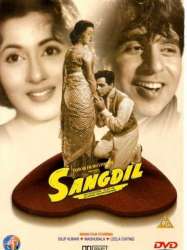
Sangdil (1952)
Genres Drame
Thèmes La musique, Musique, Bollywood
Acteurs Dilip Kumar, Madhubala, Leela Chitnis, Dara Singh, Shammi, Kuldip Kaur
Note67%





Une adaptation de Jane Eyre de Charlotte Bronte: deux enfants, un garçon et une fille, amis d'enfance, sont séparés et grandissent dans des mondes différents. La fille est amenée à être une «pujaaran» (prêtresse) tandis que le garçon devient un «thakur» (propriétaire terrien) abattu, rendu vindicatif par les injustices de la vie. Le sort, inévitablement, finit par les réunir à nouveau. Au début tout semble heureux pour le jeune couple, jusqu'à ce que la femme découvre un sombre secret de son mari...
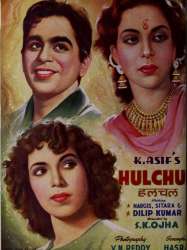
Hulchul (1951)
Réalisé par S.K. Ojha
Genres Drame
Acteurs Dilip Kumar, Nargis, K. N. Singh (Krishan Niranjan Singh), Jeevan, Balraj Sahni, Yakub
Note73%





 Connexion
Connexion



